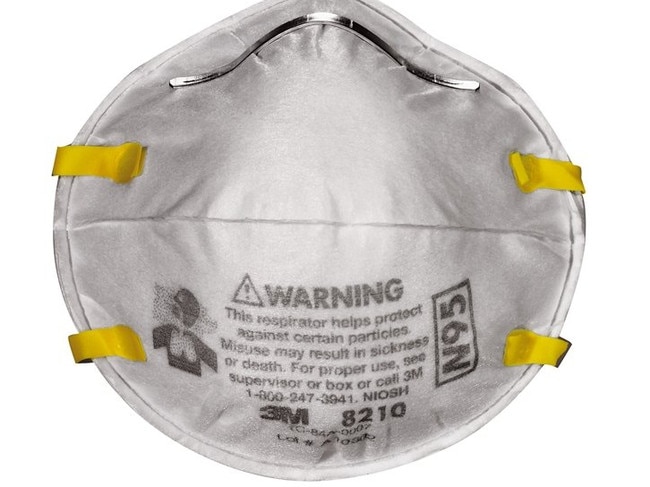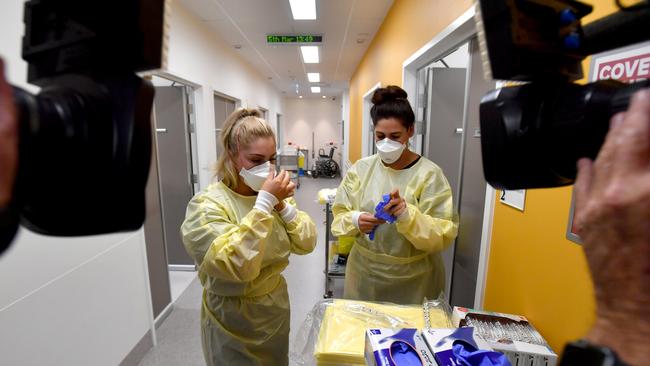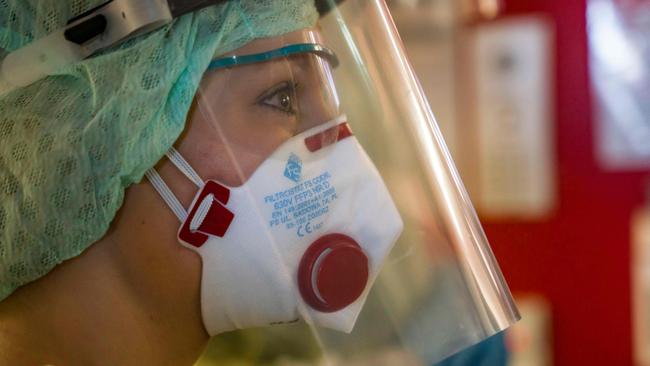Medical masks will be reissued to frontline SA Health staff after being cleared as safe overnight
Federal authorities have cleared SA Health masks for use by intensive care unit staff at the Royal Adelaide Hospital, dismissing fears they did not fully shield workers from COVID-19.
Coronavirus News
Don't miss out on the headlines from Coronavirus News. Followed categories will be added to My News.
- All the latest local, national and global coronavirus updates
- COVID-19 testing to be expanded across SA
Frontline health staff will be reissued the same masks which were believed a day ago to be ineffective against COVID-19 infection, after they were declared safe overnight.
An urgent directive had been issued to all hospital staff to use extra precautions against potential fluid transfer after officials realised their high-quality face masks do not stop all fluids.
An SA Health spokeswoman this morning said; “The Commonwealth has clarified overnight that the masks are compliant with all relevant Australian and international standards.’’
“All masks held within the national stockpile meet Therapeutic Goods Association (TGA) requirements and the required standards in Australia, the USA and EU,” the spokeswoman said.
“We will be discussing this morning how we return the masks to use in our hospitals.”

However, after The Advertiser broke the story on Thursday morning, officials withdrew the masks from use and began an audit on who had used them.
It is understood Royal Adelaide Hospital intensive care unit staff have been using the masks without face shields. One nurse in her 20s is now in quarantine with COVID-19 while 24 colleagues are also in isolation, as well as one other close contact.
The infected nurse was wearing a N95-standard mask but not the brand highlighted in the SA Health directive. SA Health officials say the masks are part of a Commonwealth stockpile and had only been in use in the RAH ICU since April 11 — a day after the nurse fell ill.
Senior doctors who informed ICU staff of the bungle and ordered an immediate halt to using the masks say they “share your frustration” as administrators scramble to increase protection.
The N95 8210 masks made by 3M need to be specially fitted to ensure a tight fit in order to fully protect against aerosols and airborne particles such as dust, fibres and fumes.
However, the specifications seen by The Advertiser show they only meet a “requirements for a minimum 95 per cent filtration efficiency against solid and liquid aerosols that do not contain oil”.
SA Health released a statement in response to inquiries from The Advertiser, saying the masks had only been available in the RAH ICU from April 11.
“We received the N95 3M Model 8210 from the Commonwealth’s stockpile of PPE,” it states.
“An infectious disease clinical expert group met last night (Wednesday) to discuss the masks and any associated risks.
“The group determined the risk for staff who have used the masks is low to negligible and no staff have been recommended to self-isolate.’’

On Thursday, SA Health’s Communicable Diseases Control Branch has issued an urgent directive to all staff noting they have received a supply of the 3M N95 8210 disposable masks.
“Staff should be made aware that these respirators are not guaranteed fluid-resistant since they have not been tested for fluid strike-through,” it states.
It says previous use of the masks without a face shield “does not constitute significant risk for infection” but goes on to order a change of practice where there is a risk of fluid strike.
This will now see clinicians undertaking such procedures also required to wear a “full length face shield that covers the front of the mask and extends down past the chin”.

It notes the face masks can be used in procedures where there is no risk of fluid strike, together with routine eye protection.
The alert also states that staff should be assured the masks give the same level of respiratory protection against infectious particles including COVID-19 as other similar certified masks, “the only difference being a possibly lower protection against direct fluid strike.”
The Central Adelaide Local Health Network released a bulletin to staff Thursday, noting the upgraded advice also applies to 3M 8110 Small and 3M 8210 Regular masks.
“We have commenced an audit and begun following up with staff who may have used these masks,” it states.
“Please assure staff that we are taking their concerns very seriously and to raise any further questions with their program leads for escalation through to the command team.”
SA Health this week took delivery of 54,000 N95 masks, as part of a shipment of almost 1.7 million face masks.
N95 masks get their name as they meet the N95 standard of the US National Institute for Occupational Safety and Health (NIOSH) air filtration rating, meaning that it filters at least 95 per cent of airborne particles.

